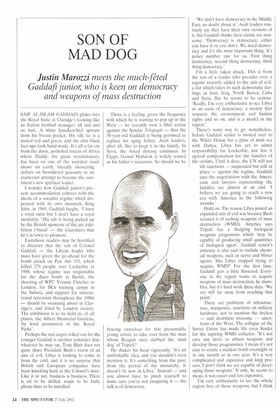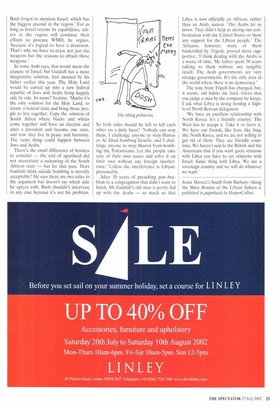SON OF MAD DOG
Justin Marozzi meets the much-feted
Gaddafi junior, who is keen on democracy and weapons of mass destruction
SAIF AL-ISLAM GADDAFI glides into the Royal Suite at Claridge's looking like an Italian football manager: all suit and no hair. A white handkerchief sprouts from his breast pocket. His silk tic is a muted red and green, and the slim black lace-ups look hand-made. It's all a far cry from the dusty, potholed streets of Africa where Daddy, the great revolutionary, has been on one of the weirdest roadshows on earth, literally showering dollars on bewildered peasants in an exuberant attempt to become the continent's new spiritual leader.
I wonder how Gaddafi junior's present accommodation coheres with the ideals of a socialist regime which dispensed with its own monarch, King Idris, in 1969. Gaddafi laughs. '1 have a royal suite but I don't have a royal mentality.' His tab is being picked up by the British sponsors of the art exhibition (banal' — the Guardian) that he's in town to promote.
Fastidious readers may be horrified to discover that the son of Colonel Gaddafi — the Libyan leader who must have given the go-ahead for the bomb attack on Pan Am 103, which killed 270 people over Lockerbie in 1988, whose regime was responsible for the disco bomb in Berlin, the shooting of WPC Yvonne Fletcher in London, for IRA training camps in the Sahara, and support for international terrorism throughout the 1980s — should be swanning about in Claridge's, and feted by London society. The exhibition is to be held in, of all places, the Albert Memorial Gardens, 'by kind permission of the Royal Parks'.
Perhaps the red carpet rolled out for the younger Gaddafi is another reminder that, whatever he may say, Tony Blair does not quite share President Bush's vision of an axis of evil. Libya is looking to come in from the cold, and it is no surprise that British and European companies have been knocking hard at the Colonel's door.
Like it or not, business is business. There is oil to be drilled, roads to be built, phone-lines to be installed. There is a feeling, given the frequency with which he is starting to pop up in the West — he recently won a libel action against the Sunday Telegraph — that the 30-year-old Gaddafi is being groomed to replace his aging father. Arab leaders, after all, like to keep it in the family. In Syria, the Assad dynasty continues. In Egypt, Gamal Mubarak is widely touted as his father's successor. So should we be bracing ourselves for this presentable young artiste to take over from the man whom Reagan once dubbed the 'mad dog' of Tripoli?
He shakes his head vigorously. 'It's an unthinkable idea, and you shouldn't even mention it. It's something from the past, from the period of the monarchy. It doesn't fit now in Libya.' Instead — and you almost have to pinch yourself to make sure you're not imagining it — the talk is of democracy. 'We don't have democracy in the Middle East, no doubt about it.' Arab leaders routinely say they have their own versions of it, but Gaddafi thinks their claims are nonsense. 'Democracy is democracy; either you have it or you don't. We need democracy and it's the most important thing. It's policy number one for us. First thing democracy, second thing democracy, third thing democracy.'
I'm a little taken aback. This is from the son of a leader who presides over a regime recently added to the axis of evil, a list which takes in such democratic darlings as Iran, Iraq, North Korea, Cuba and Syria. But he seems to be serious. 'Really, I'm very enthusiastic to see Libya as an oasis of democracy, a society that respects the environment and human rights and so on, and is a model in the region.'
There's some way to go, nonetheless, before Gaddafi senior is invited over to the White House for a glass of mint tea with Dubya. Libya has yet to admit responsibility for Lockerbie, nor has it agreed compensation for the families of the victims. Until it does, the UN will not lift sanctions — suspended but still in place — against the regime. Gaddafi says the negotiations with the Americans and lawyers representing the families are almost at an end. 'I believe we are going to reach a new era with America in the following months.'
Hold on. The reason Libya joined an expanded axis of evil was because Bush accused it of seeking weapons of mass destruction (WMD). America says Tripoli has a fledgling biological weapons programme which 'may be capable of producing small quantities of biological agent'. Gaddafi senior's armoury is also said to include chemical weapons, such as nerve and blister agents. Has Libya stopped trying to acquire WMD? For the first time Gaddafi gets a little flustered. Everyone in the region wants to acquire weapons of mass destruction, he mumbles, but it's hard work these days. We are still far away from reaching that point.'
There are problems of infrastruc ture, manpower, sanctions on military hardware, not to mention the tireless — and doubtless tiresome — atten tions of the West. The collapse of the Soviet Union has made life even harder for the aspiring WMD collector. It's not easy any more to obtain weapons and develop those programmes. I mean it's not easy to create a nuclear bomb overnight or in one month or in one year. It's a very complicated and expensive and long process. I don't think we are capable of developing those weapons.' If only, he seems to mean, it was easier and less expensive.
'I'm very enthusiastic to see the whole region free of those weapons, hut I think Bush forgot to mention Israel, which has the biggest arsenal in the region.' For as long as Israel retains its capabilities, others in the region will continue their efforts to procure WMD, he argues, 'because it's logical to have a deterrent. That's why we have to erase not just the weapons but the reasons to obtain those weapons.'
In some Arab eyes, that would mean the erasure of Israel, but Gaddafi has a more imaginative solution, first mooted by his father earlier this year. The Holy Land would be carved up into a new federal republic of Jews and Arabs living happily side by side. Its name? Isratine. 'Maybe it's the only solution for the Holy Land, to create a federal state and bring those people to live together. Copy the solution of South Africa where blacks and whites come together and have an election and elect a president and become one state, and now they live in peace and harmony. The same thing could happen between Jews and Arabs.'
There's the small difference of borders to consider — the end of apartheid did not necessitate a redrawing of the South African state — but let that pass. Does Gaddafi think suicide bombing is morally acceptable? He says there are two sides to the argument but doesn't say which side he agrees with. Bush shouldn't intervene in any case because it's not his problem. So both sides should be left to kill each other on a daily basis? 'Nobody can stop them. I challenge anyone to stop Hamas or Al Jihad bombing Israelis, and I challenge anyone to stop Sharon from bombing the Palestinians. Let the people take care of their own issues and solve it on their own without any foreign interference.' Unless the interference is Libyan, presumably.
After 30 years of preaching pan-Arabism to a congregation that didn't want to listen, Mr Gaddafi's old man is pretty fed up with the Arabs — so much so that Libya is now officially an African, rather than an Arab, nation. The Arabs let us down, They didn't help us during our confrontation with the United States or show any support for the Libyan people.' The Africans, however, many of them bankrolled by Tripoli, proved more supportive. 'I think dealing with the Arabs is a waste of time. My father spent 30 years talking to them without any tangible result. The Arab governments are very strange governments. It's the only area in the world where there is no democracy.'
The tone from Tripoli has changed, but, it seems, old habits die hard. Given that you judge a man by the company he keeps, I ask what Libya is doing hosting a highlevel North Korean delegation.
'We have an excellent relationship with North Korea. It's a friendly country. The West has to accept it. Take it or leave it We have our friends, like Iran, like Iraq, like North Korea, and we are not willing to get rid of them. They are friendly countries. We haven't said to the British and the Americans that if you want good relations with Libya you have to cut relations with Israel. Same thing with Libya. We are a sovereign country and we will do whatever we want.'
Justin Marozzi's South from Barbary: Along the Slave Routes of the Libyan Sahara is published in paperback by HarperCollins.

































































 Previous page
Previous page